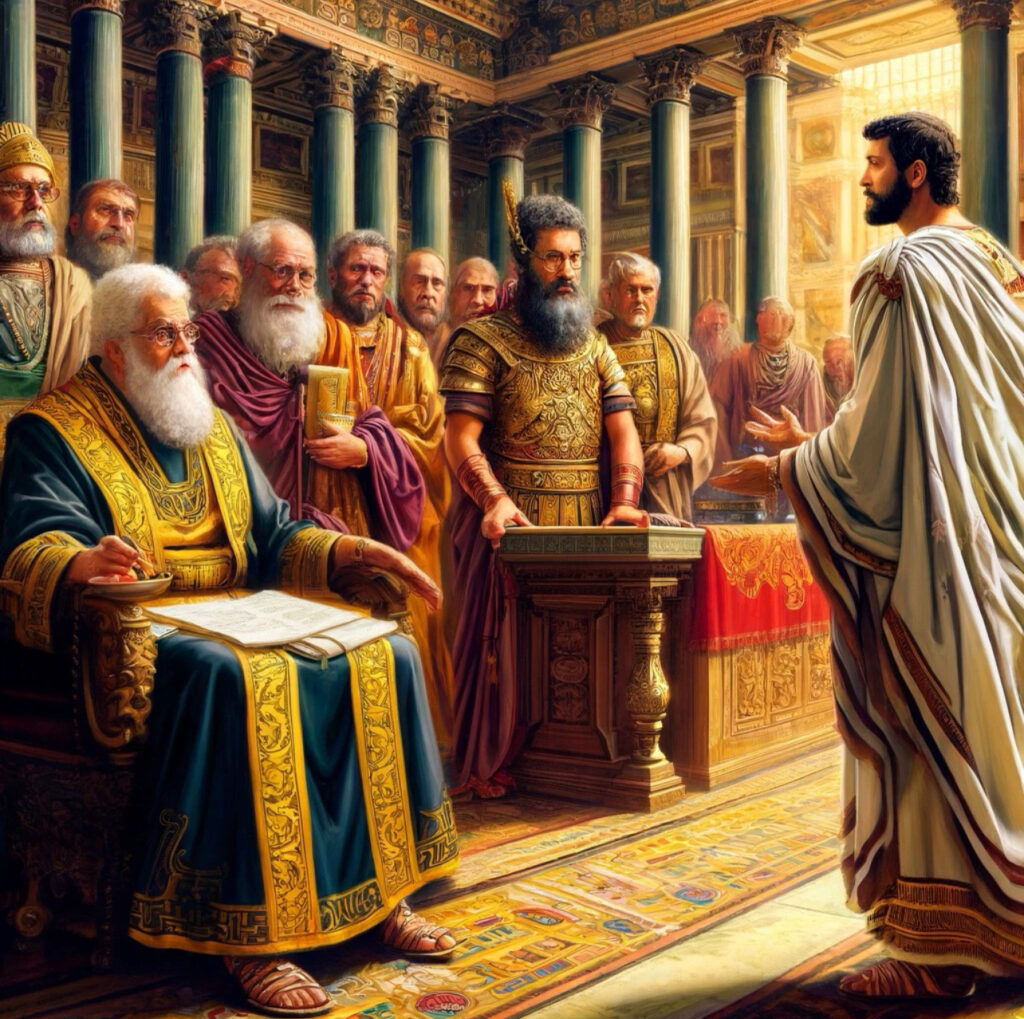
但有一件事,我向你承认,就是他们所称为异端的道,我正按着那道侍奉我祖宗的 神,又信合乎律法的和先知书上一切所记载的,并且靠着 神,盼望死人,无论善恶,都要复活,就是他们自己也有这个盼望。我因此自己勉励,对 神对人,常存无亏的良心。(使徒行传 24:14-16 和合本)
上面的经文是在公元58年,使徒保罗在被犹太宗教领袖抓捕并交给罗马巡抚腓力斯后,发表了一番铿锵有力的辩护。面对腓力斯、祭司长亚拿尼亚、众长老以及辩士帖土罗等人,保罗坦诚地表达了他对基督教‘道’的信仰与实践。彼时距离耶稣被钉十字架过了约25年。在场的巡抚、祭祀长和众长老、辩士等人的心理活动各有不同,他们分别代表着罗马统治者、传统犹太宗教领袖和宗教捍卫者。今天重点思考犹太宗教领袖为什么抵制保罗,就像在此之前抵制、迫害耶稣基督那样,门徒该怎么做。

一、先看一下公元前后犹太地的统治情况:
罗马于公元前63年由庞培大帝占领耶路撒冷开始对犹太地区的统治。这种统治形态一直持续到公元135年巴尔科克巴起义结束,大约持续了198年。在这段时间里,耶路撒冷最初是作为罗马的附属王国,由如希律大帝这样的当地统治者管理,他们由罗马任命。公元6年后,耶路撒冷成为罗马的直辖省份,由罗马官员直接管理,直到最后、也是主要的一次犹太起义巴尔·科克巴起义,之后罗马对该地区的管理方式和人口特征发生了重大变化。
二、公元前后犹太地的主要信仰和犹太教祭祀阶层对基督教传播的担忧。
在公元前后的犹太社会中,犹太宗教领袖仍然持守着摩西律法规定的职责,即便是在罗马统治期间也拥有重要的地位和权威,犹太信众对掌权者的‘顺服’也在某种程度上与罗马统治者的要求吻合,达成了一种默契。祭祀的权力建立在对民众宗教生活的指导和控制上,当耶稣及其门徒,乃至后来保罗的福音传播活动开始在犹太社会中兴起时,这些宗教领袖面临了来自新信仰的挑战,引发了他们的担忧和反应,部分原因如下:
首先,基督教传教活动对犹太宗教领袖的权威和影响力构成了威胁。基督教所传播的教义与犹太传统教义不符,尤其是关于耶稣基督的复活和救赎的观念。这引发了犹太宗教领袖对其传统权威受到动摇的担忧,因为人们可能会转向新的宗教信仰,而不再依赖于他们的指导和控制。
其次,犹太宗教领袖还担心失去对广大犹太信徒的控制和经济支持。他们依靠民众的捐赠和奉献来维持自己的生活和宗教事务,因此,如果信徒减少,他们可能会缺乏奉养供给,从而影响到他们的生活和地位。他们试图通过维护传统教义和权威来保持自己的地位和影响力,维持经济上的支持。
因此,当面临来自基督教传教活动的挑战时,犹太宗教领袖往往会采取强硬手段来维护自己的地位和利益,不仅为了自己,也为了维护与罗马统治者那种稳定信众权威的默契,他们可能会借力罗马统治者颁布的法律手段来打压异端邪说,比如辩士帖土罗指责保罗“是鼓动普天下众犹太人生乱的“(徒24:5c)、“连圣殿他也想要污秽“(徒24:6a)等,通过这些措施对持异议者进行处罚和迫害,阻止传教活动。对于这些宗教领袖来说,维护自己的特权和利益是至关重要的,因此他们会竭尽所能来保护自己的地位和权力。
回顾一下犹太领袖对耶稣传扬福音的迫害,他们视福音为异端邪说,耶稣在祂的传道中强调了爱、宽恕、怜悯以及与传统律法的关系,这与犹太宗教领袖所持教义有所不同,挑战着犹太教传统和权威。耶稣强调了心灵的净化和对他人的关爱,而不仅仅是像法利赛人那样对律法的表面遵守,“耶稣说:“以赛亚指着你们假冒为善之人所说的预言是不错的。如经上说:‘这百姓用嘴唇尊敬我,心却远离我。”(马可福音 7:6 和合本)。
耶稣的教导和神迹奇事更是吸引了人们的注意,并使他成为了当时社会中的一个重要人物。“耶稣对他说:“你要尽心、尽性、尽意,爱主你的 神。这是诫命中的第一,且是最大的。其次也相仿,就是要爱人如己。这两条诫命是律法和先知一切道理的总纲。””(马太福音 22:37-40 和合本)
鉴于这些担忧,犹太宗教领袖采取了一系列措施来对付耶稣。祭祀阶层及其文士和法利赛人通过对祂进行质询和挑战来揭露祂的‘异端邪说’,借助罗马统治者的法律手段逮捕祂并进行所谓的审判直至定罪并处以死刑,试图终结祂的影响力并阻止祂的传教活动。
三、福音的种子已经播下,且广为流传。
在135年巴尔·科克巴起义后,罗马采取了严厉的措施来镇压进一步的犹太抵抗并巩固对犹太地区的控制。罗马皇帝哈德良对该省进行了重组,并实施了几项重大变革:
如耶路撒冷的更名和重建、禁止犹太人进入(圣殿被毁日除外);禁止了包括割礼在内的某些犹太习俗;罗马殖民活动增加,减少犹太人口的影响力等等。
这些行动导致了犹太地区在人口和文化上的重大变化,实际上结束了犹太人在先前罗马统治者下的任何自主样貌。尽管耶路撒冷的基督教活动因哈德良的禁令受到限制,基督教并没有停止传播。基督教从犹太教中分离出来后,迅速传播到罗马帝国的其他地区,包括亚洲小、希腊、埃及、甚至是罗马本土。到了2世纪和3世纪,基督教已在许多罗马城市建立了坚实的教会组织。
至此,我们再回到文章开头的经文场景,可以看出,面对“政、教”强权保罗的陈述坦然自若,眼神直视每一位在场的人,似在触及每个人的心灵。这一刻,他不仅是在为自己辩护,更是在为他的信仰作见证。保罗的三次布道旅行和其他门徒为基督教的传播做出了不可估量的贡献,即便是在耶路撒冷‘更名’、无法在圣殿遗址敬拜这样的情况下也没有停止。通过保罗的例子,我们看到,在逆境中坚持真理和信仰的力量能够启发和改变无数人的生命。
四、读经体会:
耶稣在‘道成肉身’显现到这个父神创造的世界后,为了将福音传给‘你、我、他/她’,虽身处罗马的强权统治下,仍借助于父神的旨意并忍受着巨大的试炼,将福音传播到那片土地上。
新约希腊文的耶稣Ἰησοῦς和旧约希伯来文的约书亚יְהוֹשׁוּעַ实为一个词(英文:Joshua or Jehoshua = “Jehovah is salvation”耶和华是拯救者)。可否大胆想一下,在耶稣降临到世上的1400多年前,约书亚按照神的旨意从摩西手中接过权柄带领以色列人进入迦南获取了一片以色列人肉身需要安顿的‘流奶与蜜‘之地,而耶稣基督按照父神旨意但将人们带入了另一片乐土,那就是永生,并且按照祂的旨意行使‘治理这地’这地的权利和义务,神就赐福给他们,又对他们说:“要生养众多,遍满地面,治理这地;也要管理海里的鱼、空中的鸟,和地上各样行动的活物。”(创世记 1:28 和合本)
今天,因着耶稣基督赐下的福音、以及保罗和许许多多耶稣门徒的见证,我们得以被神拣选,成为这片新乐土的拥有者和现实地土的‘管理者’,无论你身处哪个国家,无论你处于何种境遇,无论你身处患难和疾病与否,无论你面对怎样的“大祭司”,始终不要忘了自己的身份,为自己、为所爱的、所不爱的祷告,效仿耶稣基督,以积极的心态参与到福音的持守、传播和社会实践中,不妄基督为我们付出的代价和应许。
弟兄姐妹们,面对‘祭祀’阶层及现代社会的挑战,你认为我们如何更好地见证基督的爱?
(如有建议敬请留言讨论,邮箱:[email protected])
Facing the Priesthood, What Should the Disciples Do?

“But there is one thing I must confess to you: I am serving the God of my forefathers according to what they call a heresy—a teaching that is in keeping with the Law and everything written in the Prophets—and I also have the hope of a resurrection of both the righteous and the unrighteous—just as they themselves have this hope. Therefore, I strive to maintain an unblemished conscience before God and man.”(Acts 24:14–16, Chinese Union Version)
The above passage is from AD 58, when the apostle Paul, after being seized by Jewish religious leaders and handed over to the Roman governor Felix, delivered a powerful defense. Facing Felix, the high priest Ananias, several elders, and the advocate Tertullus, Paul boldly expressed his faith and the practice of the “Way” of Christ. This took place about 25 years after Jesus was crucified. Each person present—the Roman governor, the priestly leaders, the elders, and the advocate—had differing attitudes, representing the Roman authorities, the traditional Jewish religious leaders, and those defending the faith. Today, we focus on why the Jewish religious leaders resisted Paul—as they had opposed and persecuted Jesus—and ask: What should the disciples do in such situations?

I. The State of Governance in Jewish Lands Around the Turn of the Era
Roman rule in the Jewish regions began in 63 BC when Pompey the Great occupied Jerusalem. This form of governance continued until AD 135, with the end marked by the Bar Kokhba revolt, lasting nearly 198 years. Initially, Jerusalem was a client kingdom ruled by local leaders such as Herod the Great, appointed by Rome. After AD 6, however, Jerusalem became a directly administered Roman province, governed by Roman officials up until the Bar Kokhba revolt, when Rome dramatically changed its methods of rule and the region’s demographic characteristics.
Image Description: This image portrays a scene based on Acts 24:1–2, where the high priest Ananias, several elders, and the advocate Tertullus are interrogating the apostle Paul before Roman governor Felix. The setting is a lavishly decorated Roman hall.
II. The Concerns of the Jewish Religious Leaders Regarding the Spread of Christianity
In Jewish society of that era, the religious leaders continued to uphold the duties prescribed by Moses’ Law. Even under Roman rule, they maintained significant status and authority. In many respects, the obedience expected from the Jewish people under these leaders even aligned with the requirements of Roman authority, resulting in an implicit understanding. The priestly power was built on guiding and controlling the religious life of the people.
When Jesus and His disciples—and later Paul with his gospel—began to spread their message among the Jews, these religious leaders faced a challenge from the new faith. Their concerns arose for several reasons:
- Threat to Authority and Influence: The Christian message differed from traditional Jewish teachings—especially regarding the resurrection and salvation through Jesus Christ. This divergence threatened the established authority of the Jewish leaders as people might shift their allegiance to the new faith, undermining the leaders’ control and guidance.
- Economic and Social Control: The leaders depended on the donations and offerings of the people to sustain their lifestyles and religious operations. A decline in the number of adherents would not only weaken their authority but also jeopardize their economic support. Thus, maintaining traditional doctrine was seen as essential to preserving their status.
Consequently, when confronted with the challenge presented by the rising Christian movement, Jewish religious leaders often resorted to harsh measures to defend their interests. Their objective was not only self-preservation but also maintaining the tacit agreement with Roman authorities concerning the control of the populace. They sometimes invoked Roman legal measures to suppress what they deemed heretical teaching—for instance, the advocate Tertullus accused Paul of “inciting all the Jews throughout the world” (Acts 24:5c) and “even defiling the temple” (Acts 24:6a). Such charges were employed to punish and persecute dissenters and to halt missionary activities. For these religious leaders, protecting their privileges and influence was paramount.
Reflecting on the persecution of Jesus by these very leaders, we observe that they regarded His gospel as heresy. During His ministry, Jesus emphasized love, forgiveness, and mercy, as well as a heart-centered approach to the Law—challenging the superficiality of the Pharisees’ adherence. He even quoted Isaiah to criticize the hypocrisy of those who honor Him with their lips while their hearts are far from Him (cf. Mark 7:6, Chinese Union Version).
Jesus’ teaching and miracles drew significant attention, establishing Him as a prominent figure in society. As He declared, “You shall love the Lord your God with all your heart, with all your soul, and with all your mind. This is the first and greatest commandment. And the second is like it: You shall love your neighbor as yourself. On these two commandments hang all the Law and the Prophets” (Matthew 22:37–40, Chinese Union Version).
In response to these challenges, the religious authorities took a series of measures against Jesus—questioning Him, challenging His views, and ultimately using Roman legal power to arrest, try, and condemn Him, all in an attempt to stifle His influence and halt His ministry.
III. The Gospel Sown and Widely Disseminated
After the Bar Kokhba revolt of AD 135, Rome implemented strict measures to suppress further Jewish resistance and to cement its control over the region. Emperor Hadrian reorganized the province and enacted significant reforms such as:
- Renaming and rebuilding Jerusalem, along with imposing restrictions on Jewish access (except on days of temple commemoration);
- Banning certain Jewish customs, including circumcision;
- Enhancing Roman colonization, which diluted the influence of the Jewish population.
These actions resulted in major demographic and cultural shifts in the Jewish regions, effectively ending any form of autonomous Jewish rule under the previous Roman system. Despite restrictions imposed on Christian activities in Jerusalem by Hadrian’s edicts, the spread of Christianity did not cease. After separating from Judaism, Christianity rapidly expanded throughout the Roman Empire, reaching Asia Minor, Greece, Egypt, and even Rome itself. By the second and third centuries, robust church structures had been established in many Roman cities.
Returning to the scene at the beginning, we can observe how Paul, when facing the combined powers of government and religious authority, spoke with calm determination and a penetrating gaze as if reaching straight into the hearts of everyone present. In that moment, he was not merely defending himself—he was bearing witness to his faith. Paul’s three missionary journeys and the contributions of numerous other disciples have immeasurably advanced the cause of Christianity, even when practical worship was thwarted by the renaming of Jerusalem and the inability to worship at the temple site. Paul’s example shows that steadfast adherence to truth and faith, even in adversity, can inspire and transform countless lives.
IV. Reflections on Scripture
After Jesus—the Word made flesh—appeared in this world created by our Heavenly Father, He came to bring the Gospel to “you, me, and them.” Although He lived under the oppressive rule of Rome, He still, by the will of the Father and amidst immense trials, spread the Gospel to that land.
In New Testament Greek, the name for Jesus is Ἰησοῦς (Iēsous), which is essentially the same as the Hebrew name (Yehoshua) found in the Old Testament—meaning “Jehovah is salvation.” Imagine that over 1,400 years before Jesus’s coming, Joshua, in accordance with God’s will, received authority from Moses to lead the Israelites into Canaan—a land described as “flowing with milk and honey”—where the body of the people would settle. In a similar yet transcendent manner, Jesus Christ, in obedience to the Father’s will, brings people into a new kind of paradise—eternal life—and exercises the rights and responsibilities of ruling this earth. God blesses them and commands: “Be fruitful, multiply, fill the earth, and subdue it; and rule over the fish of the sea, the birds of the air, and every living thing that moves on the earth.” (Genesis 1:28, Chinese Union Version)
Today, because of the Gospel given by Jesus Christ—and through the testimony of Paul and countless other disciples—we have been chosen by God to become inheritors of this new paradise and “rulers” of the present world. No matter which country you live in, regardless of your circumstances, whether you are enduring afflictions or facing challenges from any “high priest,” never forget your identity. Pray for yourself, those you love, and even for those you do not love. Emulate Jesus Christ by adopting a positive attitude in preserving, sharing, and putting the Gospel into practice, never taking for granted the price and promises paid on our behalf.
Brothers and sisters, in the face of challenges from the priestly class and modern society, how do you think we can more effectively witness the love of Christ?
-
阴霾国人的焦虑根源:一个缺乏罪之反省民族的必然(EN ver. inside)
文 / HuSir 给非信徒读者的阅读提示 若你并非宗教信徒,阅读本文时无需将“悔改”“罪”等词理解为宗教…
-
写给未来读到这些文字的人(EN ver. inside)
——一位身处当下的人留下的说明 文 / HuSir 如果你正在读这些文字,便如同见到了一个人,那就是我。很…
-
自由不是缺席,而是人尚未准备好(EN ver. inside)
——一位自由世界的过来人,回望大洋国。 文 / HuSir 我曾生活在一个自由世界。那里的制度并…
-
从负责人到同行者(EN ver. inside)
——一段关于信仰、边界与交托的反思 文 / HuSir 顾弟兄曾在一个家庭教会中服事,也一度承担负责人角色…
-
当我们知道该顺服,却仍一次次想要做主(EN ver. inside)
——写在〈当信仰进入家庭,却把家庭推远〉之后:一段关于回转与操练的自白 文 / HuSir 在上一篇文章中…
-
当信仰进入家庭,却把家庭推远(EN ver. inside)
——从阴霾国家庭式教会的困境,谈真正的家庭信仰之路 文 / HuSir 在阴霾国的特殊处境中,“家庭教会”…
-
为什么“活着”永远不足以支撑一个文明(EN ver. inside)
——从生存模式走向民主社会的真实路径 文 / HuSir “活着”,是人生而为人的最低要求,也是任何社会秩…
-
没有人需要成为狄仁杰(EN ver. inside)
——关于真相、细节与普通人的胆魄文 / HuSir 简介 狄仁杰(630—700),唐代名臣,以刚正善断著…
-
核酸人民盼望怎样的未来和希望?(EN ver. inside)
——写给转型时代的阴霾国人 文 / HuSir 前言 在这篇文章里,不会有煽动情绪,也不会有发泄不满,甚至暂…
-
世界公司与文明治理的转型(EN ver. inside)
——旧权力结构为何正在失去世界的管理权 文/HuSir 二十一世纪的世界,正在悄然完成一次治理逻辑的转型。…
-
为什么人如此抗拒悔改?(EN ver. inside)
——从心理、防御到身体的潜在代价 文/HuSir 摘要 本文探讨人们为何抗拒悔改与反思。作者指出,许多人的…
-
那堵真正的墙,在我们心里(EN ver. inside)
文/HuSir 阴霾国社会从来不是铁板一块。人们对自身处境、对所处环境、对权力与自由的理解,始终存在巨大差…

发表回复